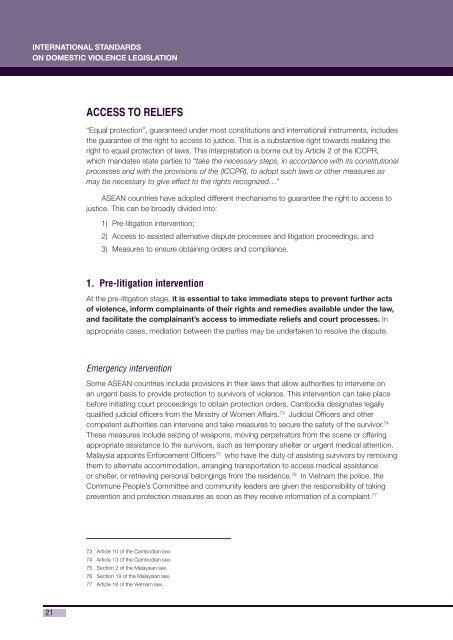Domestic Violence Legislation and its Implementation
Domestic Violence Legislation and its Implementation
Domestic Violence Legislation and its Implementation
Create successful ePaper yourself
Turn your PDF publications into a flip-book with our unique Google optimized e-Paper software.
INTERNATIONAL STANDARDS<br />
ON DOMESTIC VIOLENCE LEGISLATION<br />
21<br />
ACCESS TO RELIEFS<br />
“Equal protection”, guaranteed under most constitutions <strong>and</strong> international instruments, includes<br />
the guarantee of the right to access to justice. This is a substantive right towards realizing the<br />
right to equal protection of laws. This interpretation is borne out by Article 2 of the ICCPR,<br />
which m<strong>and</strong>ates state parties to “take the necessary steps, in accordance with <strong>its</strong> constitutional<br />
processes <strong>and</strong> with the provisions of the (ICCPR), to adopt such laws or other measures as<br />
may be necessary to give effect to the rights recognized…”<br />
ASEAN countries have adopted different mechanisms to guarantee the right to access to<br />
justice. This can be broadly divided into:<br />
1) Pre-litigation intervention;<br />
2) Access to assisted alternative dispute processes <strong>and</strong> litigation proceedings; <strong>and</strong><br />
3) Measures to ensure obtaining orders <strong>and</strong> compliance.<br />
1. Pre-litigation intervention<br />
At the pre-litigation stage, it is essential to take immediate steps to prevent further acts<br />
of violence, inform complainants of their rights <strong>and</strong> remedies available under the law,<br />
<strong>and</strong> facilitate the complainant’s access to immediate reliefs <strong>and</strong> court processes. In<br />
appropriate cases, mediation between the parties may be undertaken to resolve the dispute.<br />
Emergency intervention<br />
Some ASEAN countries include provisions in their laws that allow authorities to intervene on<br />
an urgent basis to provide protection to survivors of violence. This intervention can take place<br />
before initiating court proceedings to obtain protection orders. Cambodia designates legally<br />
qualifi ed judicial offi cers from the Ministry of Women Affairs. 73 Judicial Offi cers <strong>and</strong> other<br />
competent authorities can intervene <strong>and</strong> take measures to secure the safety of the survivor. 74<br />
These measures include seizing of weapons, moving perpetrators from the scene or offering<br />
appropriate assistance to the survivors, such as temporary shelter or urgent medical attention.<br />
Malaysia appoints Enforcement Offi cers 75 who have the duty of assisting survivors by removing<br />
them to alternate accommodation, arranging transportation to access medical assistance<br />
or shelter, or retrieving personal belongings from the residence. 76 In Vietnam the police, the<br />
Commune People’s Committee <strong>and</strong> community leaders are given the responsibility of taking<br />
prevention <strong>and</strong> protection measures as soon as they receive information of a complaint. 77<br />
73 Article 10 of the Cambodian law.<br />
74 Article 13 of the Cambodian law.<br />
75 Section 2 of the Malaysian law.<br />
76 Section 19 of the Malaysian law.<br />
77 Article 18 of the Vietnam law.

















